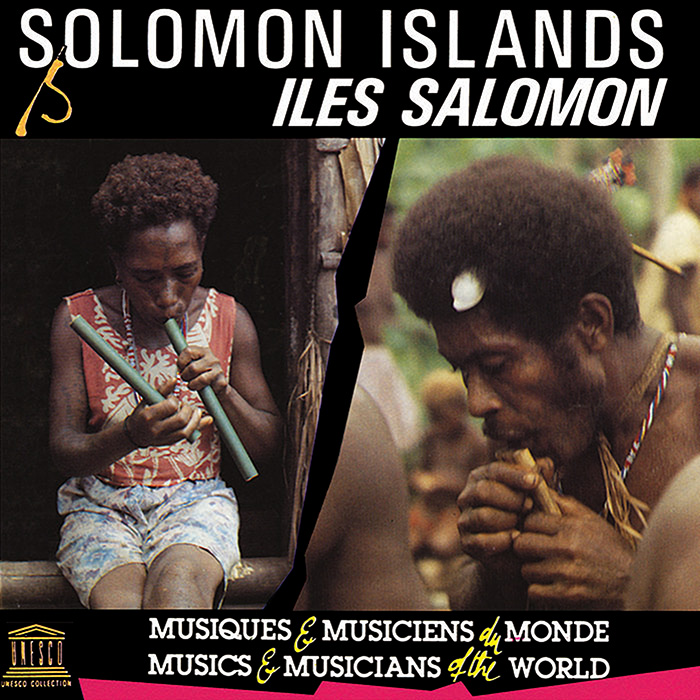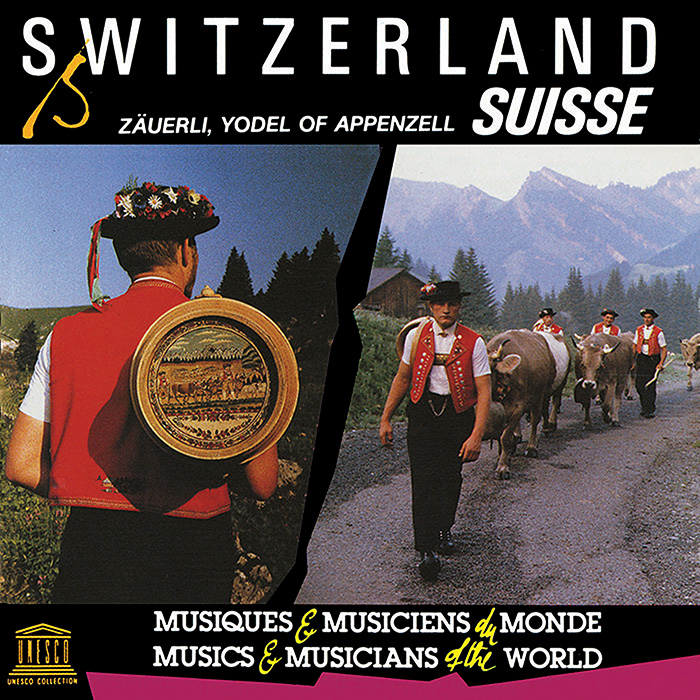-
UNESCO Collection Week 37: Sounds from Switzerland and the Solomon Islands
This week’s UNESCO reissues, Switzerland: Zäuerli – Yodel of Appenzell and Solomon Islands: Fataleka and Baegu Music from Malaita, provide diverse examples of a tradition that seems lost in the modern world—the work song.
GUEST BLOG
By Steven Arntson
To start my guest appearance here, I'd like to thank Smithsonian Folkways for inviting me to write about Switzerland: Zäuerli – Yodel of Appenzell and Solomon Islands: Fataleka and Baegu Music from Malaita, and also for producing so many fascinating audio documents over the years. It's because of you, Folkways, that a bookish Seattleite like myself with no great urge to travel can experience the audible dimension of such widely various human cultures.
I'm a longtime fan of Folkways, and have many Folkways albums in my collection on LP, CD, and in digital form. My most recent acquisition, from the Seattle Goodwill, is the fascinating Folkways LP FX6124 (which I mention here for your Boolean search leisure). I hope the UNESCO collection is listened to widely. In my opinion, you could not find a more inspiring proof of the shared love of music that unites the human family, and the incredible diversity of expression that love calls into being.
Solomon Islands: Fataleka and Baegu Music from Malaita was originally released in the year of my own birth, 1973, and it got me thinking about my great aunt Norma. In the '60s and early '70s, she worked at a missionary hospital in New Guinea (a skip and a jump from the Solomon Islands). I remember her demonstrating, to my eight-year-old delight, the pidgin language she knew for talking with people in New Guinea.I like to imagine my great aunt’s life as a farm girl in North Dakota, and the American popular music she no doubt grew up with, and then imagine her leaving to travel to New Guinea. The great calm beauty and the pronounced intimacy of the small performances captured on this disc placed me right there. I thought of my aunt in the middle of a world she could hardly have imagined before—a world whose singing tradition emphasizes humming, and whose primary musical instrument, the susuku, is built from bamboo and in performance produces dense tonal clusters whose effortless dissonance would surely have surprised her.
AudioListening to Switzerland: Zäuerli at first was quite a jolt, but I quickly found that there were some beautiful similarities between the two recordings. The yodels on Switzerland: Zäuerli, though perfectly distinct from the sounds on Solomon Islands, are nonetheless similar in their intimacy, as well as in their clear connection with the rituals and necessities of daily life.Such purposeful music has always had a particular attraction for me. I remember once hearing an interview with percussionist Tito Puente about which kinds of musical repertoire endure longest, and his answer was “It will last if it has a dance to go with it.” And while dancing is one activity we still do to music, it seems that the modern world has lost the occasions that accompany many other traditional forms. While we work, we consume music (on headphones, for instance) but we don’t produce it. There’s something lost here.
Anyone who’s heard a few sailing songs has encountered tunes yoked to the performance of one’s duties. Another profound example is Alan Lomax’s album Negro Prison Songs—Mississippi State Penitentiary, which features recordings of work songs and field hollers. “They were born,” said Lomax of those songs, “out of the very rock and earth of this country, as black hands broke the soil, moved, reformed it, and rivers of stinging sweat poured upon the land under the blazing heat of Southern skies.”1
On Switzerland: Zäuerli, my first work song encounter is “Zäuerli sung while milking the cows,” an intricate yodel performed alongside loud sounds of milk squirting into a pail. This is followed shortly by “Zäuerli sung while going up to the alpine pastures.”
Of course, our world isn’t completely devoid of daily repertoire, and certainly everyone is familiar with the lullaby, for instance, which continues to occupy a place in our world (though even here perhaps diminished from former centuries). There’s a beautiful lullaby on Solomon Islands: “Rorogwella Lullabye.”
Still and all, I find myself occasionally ruminating on the lessening of music production in the lives of modern Westerners. I don’t like it. Making music is a healthy human activity and, like dance, has every possibility of improving a person’s life. Perhaps it’s the case that modern labor can’t be easily yoked to musical forms, but I think it’s more that we’re culturally quiet. We’ve become embarrassed to sing, and embarrassed to dance. Perhaps this is one lesson these musics can teach us—that such activities are normal. Singing a walking song while you’re walking somewhere isn’t odd.
I hope you do listen to the diverse musics of Switzerland: Zäuerli – Yodel of Appenzell and Solomon Islands: Fataleka and Baegu. The intimacy of these recordings is wonderful, and nowhere else will you have such a transporting experience, short of packing up and moving (which my great aunt did recommend to me).
1 Alan Lomax, liner notes to Negro Prison Songs—Mississippi State Penitentiary, Tradition Records, 1957, LP.
Steven Arntson is the author of the young adult novel The Wrap-Up List and the forthcoming The Trap (April, 2015). Steven lives in Seattle, where he writes novels and plays the concertina.
UNESCO Collection Week 37: Sounds from Switzerland and the Solomon Islands | Smithsonian Folkways Recordings



